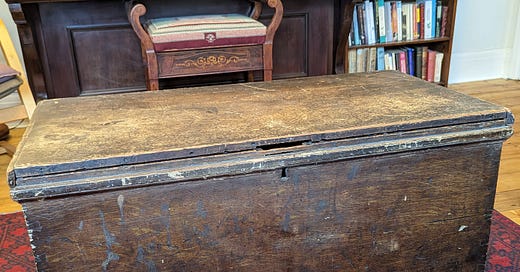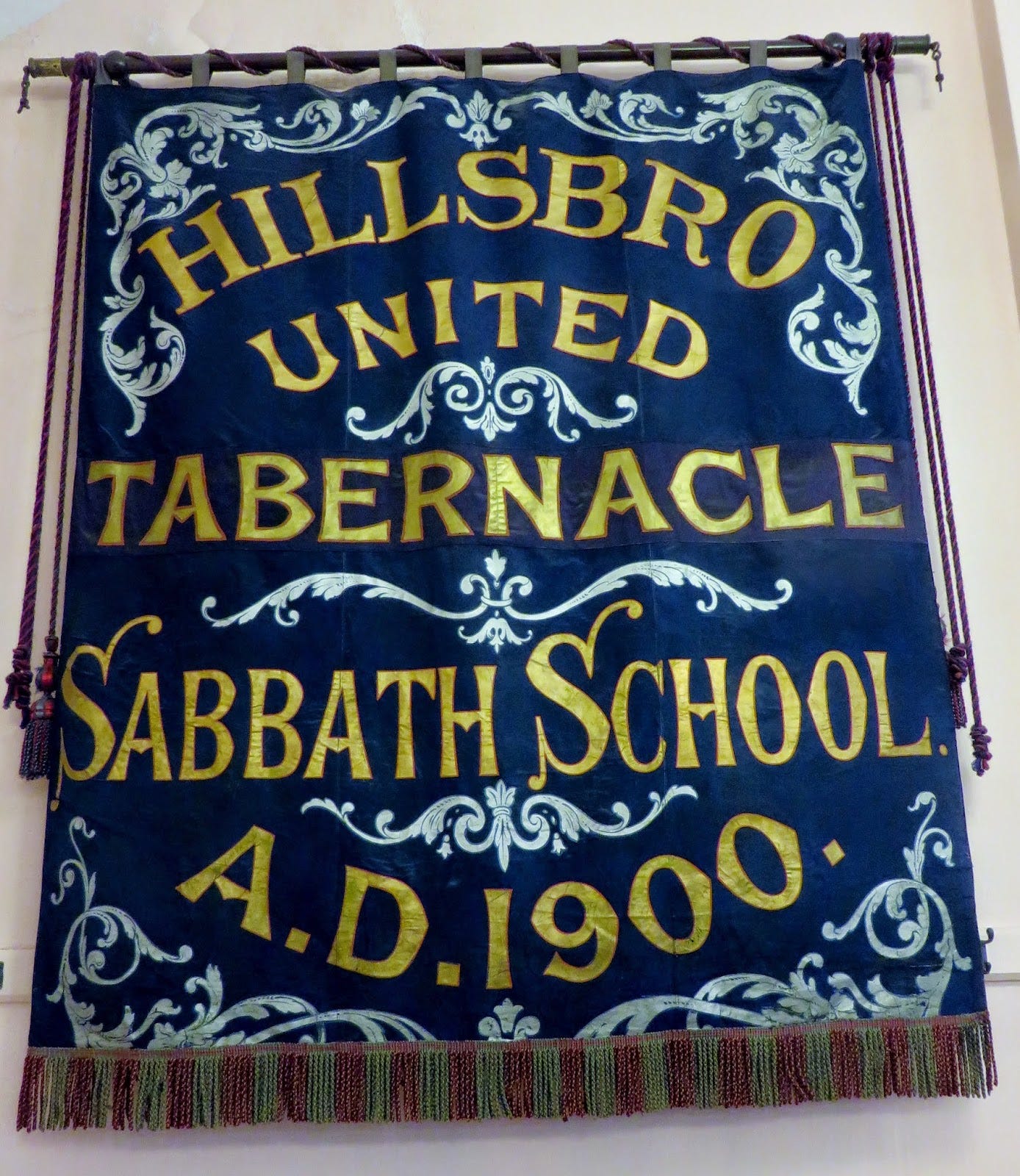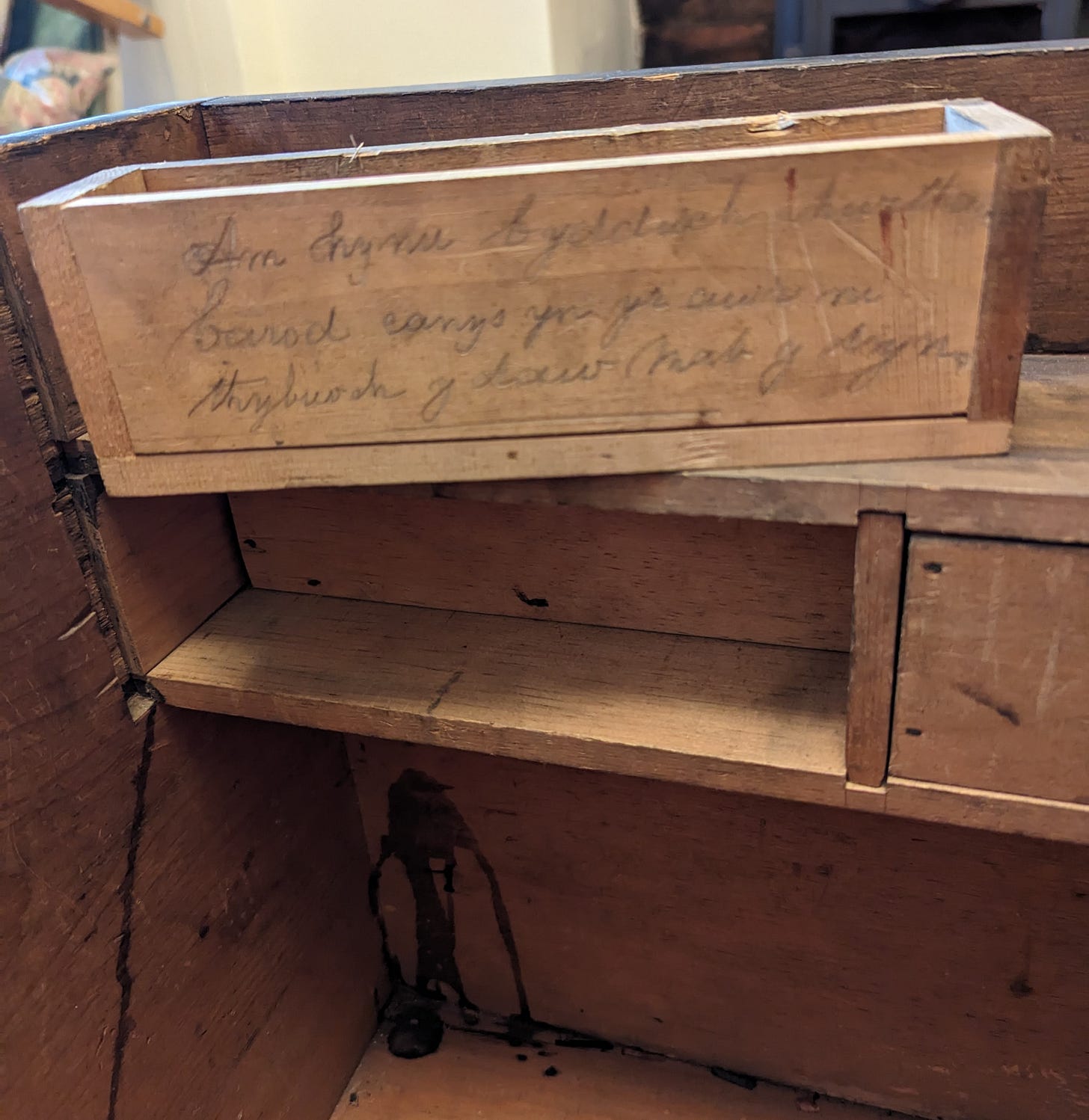A battered old pine chest that for now rests with me, has travelled with generations of my Welsh family since before 1872. It holds most of the accumulated family correspondence, photographs and publications that I’m now drawing on to prompt the making of these new folk songs. Metaphorically it also held the family’s religious devotion during those times, and in that sense is still a protective space…
I think it was made in Caernarfon and first was given to my great-granduncle Henry Jones (junior) when he left his Ynys Môn family farm Careg Iago seeking work at the age of 15. It was always referred to as a ‘seaman’s chest’ by my mother, but so far I haven’t been able to corroborate whether Henry left for a life at sea or not, although it could have been entirely possible given Anglesey’s several working ports at that time. Henry died back at Careg Iago ‘after a long illness’ aged only 26 yrs.
I like to think my great-grandmother Martha inherited the chest or he passed it to her on returning to the family home. She would have been in her early twenties, still unmarried, and as the youngest of ten siblings was the last one to stay to maintain the farm after 1881 along with Elinor (Ellen) her widowed mother.
My use of the term Hope Chest reflects how I imagine its significance and promise may have been to her back then, and I guess also its significance to me now and going forward. Normally its a term for a girl’s coming of age or dowry chest, which would have been at age 14 or even earlier in C19th Wales.
Henry and Martha’s family were devout. Fascinatingly, on the inside of the lid of the chest, and with the help of infra-red photography still just about legible in faint pencil script, are Welsh Old Testament verses advising against excesses of wine that could inevitably only lead to unbridled musicmaking..
Gwae y rhai a gyfodant yn fore / i ddilyn diod gadarn / a arhosant hyd yr hwyr / hyd oni enynno y gwin hwynt (EISA 5:11)
Woe to those who consecrated in morning / to follow a firm drink / and they stay till the evening / until the wine was not encased (Isaiah 5:11)
These scripts advising temperance were no doubt there to strongly caution the teenager Henry as he set out in life, and surely would have stayed on the consciences of the chest’s future owners… whispered words from the prophet written in a slowly decaying C19th Welsh language through an era marked by migration, devotion, chapel and verse, as it sat in the rooms of successive family houses, from Martha Jones at Careg Iago, to her widowed husband the Rev Benjamin Menai Francis’ cramped Flixton brick terrace, and on to their eldest son the schoolboy & later my musician grandfather Hywel Henry Francis at Hillsborough Rd Sheffield.
As a musician finding new songwriting narratives from exploring these traces of my Welsh ancestors, I’m finding those enduring handwritten scripts magnetic and intensely personal, as marks engraved in the old wood and hidden for years to become perhaps something like a rūn (Old English) ‘a secret, mystery, runic letter, writing, counsel’. In this sense, had the author of the pencil script on our Hope Chest lid also pencilled Isaiah’s Old Testament lines that follow, of verse 5.12, the message would become someting like “Woe unto them that rise up early in the morning, that they may pursue strong drink; that continue until night, till wine inflame them! And the harp and the viol, and the tabret and pipe and wine are in their feasts; but they regard not the work of the Lord..’’ which makes me fill with musical anticipation of how we’ll hear our Songs from The Tin Tabernacl harp, kora and fiddle (and more) sing together to rise and dance on that old chest in celebration!
And once it was emptied of layers of family history, I found on the back of panels in the Hope Chest’s hidden drawers, drawings and more pencil script saying ‘am hynu byddwch chwitha barod canys yn yr awr ni thybiwch y daw mab y dyn’ which is a Welsh translation of Matthew v24:44: ‘So you also must be ready, because the Son of Man will come at an hour when you do not expect him’. These words supply a great repeat line as our new song Cist Gobaith (Hope Chest) emerges as you’ll see & hear.
Finally it would be a shame not to include an infra-red close-up shot (above) of the richly visual outside of our Hope Chest lid. There are no words here, just the captivating texture of time passing…
Cist Gobaith (Hope Chest) lyrics final draft
(Sung in Welsh with a short English calling line ‘to me this has come’ in each verse, to the traditional melody of ‘Ffarwel Ned Pugh’ (Farewell to Ned Pugh) which is mostly heard nowadays in Plygain services (Welsh Christmas carol singing) Each verse contains the lines “Am hynny y byddwch yn barod” which means “For that you will be ready” sung in response to the English line “to me this has come, to me this has come”)
Wel dyn o Stryd Bangor a chreodd y gist (Am hynny y byddwch yn barod)
Blwch gobaith, blwch morwr, ei straeon yn gudd (Am hynny y byddwch yn barod)
To me this has come, to me this has come (Am hynny y byddwch yn barod)
Wel dyn o Stryd Bangor a chreodd y gist (Am hynny y byddwch yn barod)
Wil Jones o Gaernarfon ysgythrodd rhyw ben (Am hynny y byddwch yn barod)
Geiriau hen broffwyd â phensil ar bren (Am hynny y byddwch yn barod)
To me this has come, to me this has come (Am hynny y byddwch yn barod)
Wil Jones o Gaernarfon ysgrythrodd rhyw ben (Am hynny y byddwch yn barod)
Mae’r gist wedi cyrraedd tŷ mab Carreg Iago (Am hynny y byddwch yn barod)
Mi oedd Henry yn ffarmwr, llifiwr, addolwr (Am hynny y byddwch yn barod)
To me this has come, to me this has come (Am hynny y byddwch yn barod)
Mae’r gist wedi cyrraedd tŷ mab Carreg Iago (Am hynny y byddwch yn barod)
Un noswaith gwnaeth Martha, yng nghanol ei dagrau (Am hynny y byddwch yn barod)
Llun ar y gist o ei hannwyl tad/brawd (?) Henry Am hynny y byddwch yn barod)
To me this has come, to me this has come (Am hynny y byddwch yn barod)
Un noswaith gwnaeth Martha, yng nghanol ei dagrau (Am hynny y byddwch yn barod)
Nawr mae’r gist ar ei ffordd gyda Menai a’i deulu (Am hynny y byddwch yn barod)
I’r gloddfa, y capel, tŷ teras a'r weddi (Am hynny y byddwch yn barod)
To me this has come, to me this has come (Am hynny y byddwch yn barod)
Mae’r gist ar ei ffordd gyda Menai a’i deulu (Am hyny y byddwch yn barod)
Mae’n dal y pregethau, y salmau a’r hiraeth (Am hynny y byddwch yn barod)
Ond rhyw ddydd daw dawnsio ar ben y gist gobaith (Am hynny y byddwch yn barod)
To me this has come, to me this has come (Am hynny y byddwch yn barod)
Rhyw ddydd mi fydd dawnsio ar ben y gist gobaith (Am hynny y byddwch yn barod)
English Translation Hope Chest (Cist Gobaith)
Wel dyn o Stryd Bangor a chreodd y gist / Blwch gobaith, blwch morwr, ei straeon yn gudd
A man from Bangor Street made the chest / A hope chest, a mariner’s chest, its stories hidden
Wil Jones o Gaernarfon ysgythrodd rhyw ben / Geiriau hen broffwyd â phensil ar bren
Wil Jones from Caernarfon carved the words of a prophet onto the wood with his pencil
Mae’r gist wedi cyrraedd tŷ mab Carreg Iago / Mi oedd Henry yn ffarmwr, llifiwr, addolwr
The chest has reached the son of Carreg Iago / Henry, the worshipper and the farmer
Un noswaith gwnaeth Martha, yng nghanol ei dagrau / Llun ar y gist o ei hannwyl brawd Henry
One night, in tears, Martha drew a picture on the chest of her dear brother Henry
Nawr mae’r gist ar ei ffordd gyda Menai a’i deulu / I’r gloddfa, y capel, tŷ teras a'r weddi
Now the chest is on its way with Menai and his family / To the colliery, the chapel, the terrace and the prayer
Mae’n dal y pregethau, y salmau a’r hiraeth / Ond rhyw ddydd daw dawnsio ar ben y gist gobaith
It holds the sermons, the psalms and the homesickness / But one day there will be dancing on top of the hope chest
A collaborative process works well for developing the song lyric writing in both Welsh and in English, and here my first draft ‘Hope Chest’ narrative has been fine-tuned and given back its true Welsh voice by singer & triple harpist Cerys Hafana as we collectively arranged, rehearsed and live-recorded the first four demo Songs from the Tin Tabernacle in two intensive studio days in Sheffield.
Take a listen to Cist Gobaith (Hope Chest) our third song demo recording here..
Cerys Hafana (triple harp/vocals/songwriting) / Bryony Griffith (fiddle/vocals/songwriting) / Cath Carr (tenor steelpans) / Kadialy Kouyate (kora) / Tony Francis Bowring (bass/producer)












